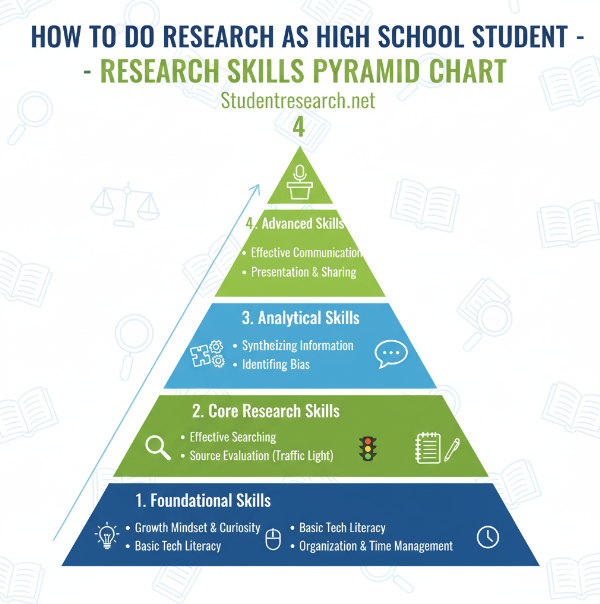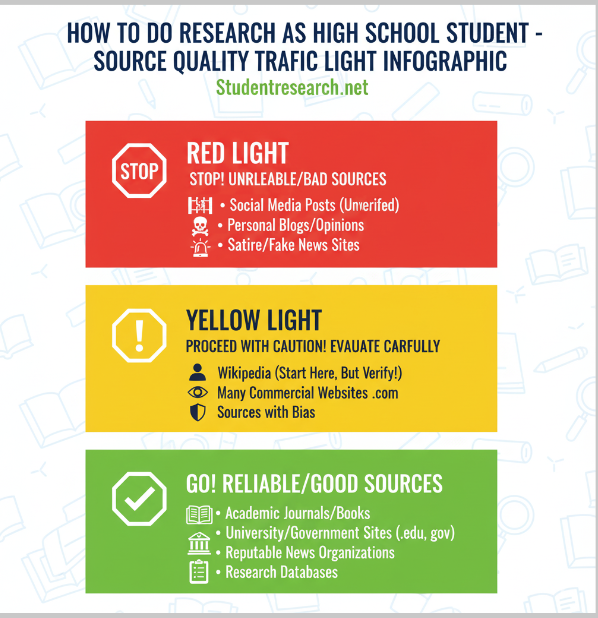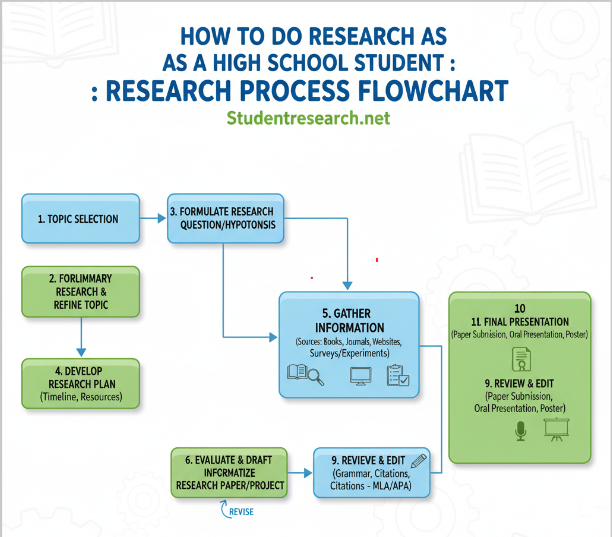Table of Contents
ToggleHow to Do Research as a High School Student – The Research Mindset
Learning how to do research as a high school student transforms your academic experience completely. Effective student research requires more than simply gathering information from random websites. Today’s student research demands critical thinking skills that prepare you for college success. Understanding research as a high school student means developing detective-like instincts that serve you throughout life. These foundational skills make the difference between mediocre assignments and exceptional academic work.
How to Think Like a Detective When Doing Research
Student research becomes powerful when you approach it like a detective solving mysteries. This detective mindset transforms how to do research as a high school student from boring task to exciting investigation.
Research as Detective Work – Following Clues to Solve Mysteries:
- Every research question becomes a mystery waiting for solutions
- Sources provide clues that lead to deeper understanding
- Dead ends and contradictions reveal important information gaps
- Multiple perspectives help build complete pictures of complex topics
- Evidence trails connect seemingly unrelated facts and concepts
Developing Curiosity and Skepticism as Core Research Traits:
- Question everything you read, including sources that seem authoritative
- Ask “why” and “how” questions instead of accepting simple explanations
- Look for patterns and connections between different pieces of information
- Challenge your own assumptions and preconceived notions regularly
- Maintain healthy skepticism while remaining open to new evidence
- Develop comfort with uncertainty and conflicting viewpoints
“Master academic success with Studentresearch.net! Get expert help with research papers, essays, dissertations, and assignments across all subjects. Professional academic writing services tailored for student excellence.”
Research Skills Every High School Student Should Develop
Building detective instincts requires mastering essential student research skills. These research abilities help high school students excel across all academic subjects.
The Three Pillars of Good Research:
- Ask better questions – Move beyond simple “what” questions to explore “why” and “how”
- Challenge assumptions – Question your own beliefs and commonly accepted ideas
- Follow the evidence – Let facts guide your conclusions, even when they contradict expectations
How Research Differs Across Academic Subjects:
- Science research emphasizes hypothesis testing and experimental evidence
- History research focuses on primary sources and contextual analysis
- Literature research explores themes, symbols, and critical interpretations
- Social studies research examines multiple perspectives and cultural contexts
- Each subject requires different types of sources and analytical approaches
- Understanding these differences improves research effectiveness significantly
How Research Helps High School Students Beyond the Classroom
Strong student research skills extend far beyond academic assignments. Learning how to do research as a high school student prepares you for lifelong success.
Real-World Applications of Research Skills:
- Evaluating news articles and social media posts for accuracy
- Making informed decisions about colleges, careers, and personal choices
- Understanding complex issues like climate change and political debates
- Comparing products and services before making purchases
- Solving problems in future workplaces and communities
Setting Up Your Research Journey:
- These foundational skills prepare you for advanced academic work
- Research abilities become more valuable in our information-rich society
- Strong research skills distinguish successful students from average performers
- Mastering research now saves time and improves results later

Research Skills High School Students Need to Master
After developing the right research mindset, students must acquire practical tools and techniques. Mastering student research requires building a comprehensive toolkit of resources and strategies. These research skills for high school students form the foundation for academic excellence. Understanding how to do research as a high school student means knowing where to find information and how to search effectively.
How to Build Your High School Research Toolkit
Successful student research depends on having the right tools and resources available. Learning how to do research as a high school student starts with building a comprehensive toolkit.
Essential Research Tools Every Student Should Know:
- School library resources including databases, books, and reference materials
- Librarian expertise for finding specialized sources and research guidance
- Free online databases like Internet Archive and Google Scholar
- Government websites offering reliable statistics and official documents
- Academic databases accessible through your school’s subscription services
Primary Research Techniques for Student Projects:
- Interview techniques for gathering firsthand information from experts
- Survey design and data collection methods for original research
- Observation skills for ethnographic and scientific studies
- Basic data analysis tools for interpreting numerical information
- Recording and transcription methods for preserving interview data
Advanced Search Strategies for Student Researchers
Building your toolkit requires mastering sophisticated search techniques. These advanced strategies help high school student research become more efficient and comprehensive.
Strategic Searching Techniques:
- Boolean operators (AND, OR, NOT) for precise database searches
- Keyword brainstorming using synonyms and related terms
- Search filters for limiting results by date, source type, or subject
- Truncation symbols for finding word variations automatically
- Phrase searching using quotation marks for exact matches
Understanding Different Information Formats:
- Books provide comprehensive coverage of broad topics
- Academic articles offer current research and specialized analysis
- Multimedia sources include documentaries, podcasts, and visual materials
- Primary sources offer firsthand accounts and original documents
- Each format serves different research purposes and audiences
How High School Students Can Find Research Mentors
Advanced search skills work best when combined with human expertise. Building relationships enhances how to do research as a high school student tremendously.
Building Your Research Support Network:
- Librarians serve as professional research guides and resource experts
- Teachers provide subject-specific guidance and assignment feedback
- Subject matter experts offer specialized knowledge and perspectives
- Peer study groups create collaborative learning opportunities
- Online communities connect you with researchers worldwide
Creating Your Personal Research Workspace:
- Digital organization systems for managing sources and notes
- Physical workspace setup for focused research sessions
- Cloud storage solutions for accessing materials anywhere
- Citation management tools for tracking source information
- Time management systems for maintaining research momentum
Studentresearch.net connects you with qualified PhD experts in every field. Enjoy on-time delivery, professional quality, and personalized academic support that guarantees your success.
How High School Students Can Evaluate Research Sources
Building research skills requires learning source evaluation techniques. Understanding source quality transforms how high school students approach academic research projects. These evaluation methods ensure student research meets academic standards consistently.
Understanding Source Quality: A High School Student’s Guide
Effective student research requires understanding source reliability levels. Learning how to do research as a high school student means recognizing quality differences between information sources.
Moving Beyond Simple Reliability Categories:
- Source quality exists on a spectrum rather than binary categories
- Context and purpose determine appropriate source types for projects
- Multiple sources provide more complete pictures than single references
- Understanding bias helps evaluate perspective rather than rejecting sources
The Hierarchy of Evidence in Academic Research:
- Primary sources – Original documents, interviews, and firsthand data
- Secondary sources – Scholarly analysis, expert commentary, and interpretations
- Tertiary sources – Encyclopedias, textbooks, and summary materials
- Each level serves different research purposes and audiences
- Understanding this hierarchy improves source selection decisions
How to Rate Research Sources as a High School Student

Source evaluation becomes systematic with clear rating criteria. These guidelines help student research maintain high academic standards consistently.
Red Light, Yellow Light, Green Light Source Evaluation:
Red Light Sources (Use with Extreme Caution):
- Social media posts without verification or expert review
- Random blogs lacking author credentials or source citations
- Heavily biased content promoting specific agendas over facts
- Outdated information that contradicts current understanding
Yellow Light Sources (Use with Careful Analysis):
- News articles from reputable outlets with fact-checking standards
- Popular magazines that cite expert sources and research
- Organizational websites that clearly state their perspectives and funding
- Wikipedia articles as starting points for finding primary sources
Green Light Sources (High Reliability for Academic Work):
- Peer-reviewed journals with rigorous editorial standards
- Academic books published by university presses
- Government data from official statistical agencies
- Established reference works with expert contributors
Understanding Bias vs. Propaganda:
- Bias involves perspective and viewpoint that can provide valuable insights
- Propaganda deliberately distorts facts to manipulate opinions
- Multiple biased sources often reveal different aspects of complex issues
- Recognizing perspective helps evaluate source usefulness rather than dismissing automatically
Subject-Specific Research Tips for High School Students
Different academic subjects require specialized evaluation approaches. Understanding how to do research as a high school student means adapting techniques to subject requirements.
Historical Sources and Context Considerations:
- Primary historical documents reflect time period perspectives and limitations
- Secondary historical analysis benefits from temporal distance and additional evidence
- Understanding historical context prevents misinterpretation of past events
- Multiple perspectives reveal complexity of historical situations
Scientific Studies and Methodology Assessment:
- Peer review process ensures scientific rigor and accuracy
- Sample size and methodology affect study reliability and generalizability
- Replication by independent researchers strengthens scientific conclusions
- Understanding limitations helps interpret results appropriately
Literary Criticism and Interpretation Analysis:
- Different critical approaches offer various interpretive frameworks
- Author credentials and theoretical background influence analytical perspectives
- Multiple interpretations enrich understanding rather than creating confusion
- Understanding critical schools helps evaluate argument validity
The Step-by-Step Research Process for High School Students

Source evaluation skills enable systematic research approaches. Following structured processes ensures student research produces high-quality results consistently. These step-by-step methods show exactly how to do research as a high school student effectively. Understanding research phases prevents overwhelm and maintains project momentum.
How to Start Your Research as a High School Student
Beginning research projects requires strategic planning and preparation. Student research succeeds when you start with clear exploration strategies.
Phase 1: The Exploration Stage
Starting with Background Research:
- Begin with general sources like encyclopedias and textbooks for topic overview
- Identify key terms, concepts, and important figures in your subject area
- Understand basic facts before diving into complex analysis
- Use preliminary reading to generate focused research questions
Using Preliminary Sources to Refine Research Questions:
- Transform broad topics into specific, answerable questions
- Ensure your question has sufficient sources available for investigation
- Check that your question fits assignment requirements and scope
- Develop questions that allow for analysis rather than simple summary
Creating Research Maps and Concept Webs:
- Visual organizers help identify connections between different aspects
- Mind maps reveal gaps in your current understanding
- Concept webs show relationships between ideas and sources
- These tools guide your search for additional information
How High School Students Can Organize Deep Research
Systematic organization prevents information overload during intensive research. These methods help student research remain manageable and productive.
Phase 2: The Deep Dive
Systematic Source Collection and Evaluation:
- Create standardized criteria for evaluating potential sources
- Maintain consistent documentation of source quality and usefulness
- Balance different types of sources for comprehensive coverage
- Track search strategies to avoid repeating unsuccessful approaches
Note-Taking Strategies That Prevent Information Overload:
- Use consistent formatting for all research notes
- Include complete citation information with every note
- Organize notes by theme rather than by source
- Summarize key points in your own words to ensure understanding
Building Your Bibliography as You Research:
- Record complete citation information immediately upon finding sources
- Use citation management tools to maintain consistency and accuracy
- Include notes about how each source contributes to your research
- Regularly review your bibliography to identify gaps or redundancies
How to Synthesize Research Findings as a High School Student
Advanced organization leads to effective synthesis of research findings. Understanding how to do research as a high school student includes combining sources meaningfully.
Phase 3: The Synthesis Process
Finding Patterns and Connections Across Sources:
- Look for recurring themes and ideas in multiple sources
- Identify areas where experts agree and disagree
- Notice how different sources complement or challenge each other
- Recognize how your research question connects different aspects
Identifying Gaps in Your Research:
- Recognize when important perspectives are missing from your sources
- Identify questions that remain unanswered after initial research
- Determine if you need additional types of sources or evidence
- Assess whether your research adequately addresses your question
Developing Your Argument or Findings:
- Use evidence to support clear, specific claims
- Address counterarguments and alternative interpretations
- Show how your analysis adds to existing understanding
- Present conclusions that follow logically from your evidence
Managing the Research Process Effectively:
- Set realistic deadlines for different research phases
- Break large projects into smaller, manageable tasks
- Regular progress reviews prevent last-minute panic
- Maintain flexibility to adjust approach based on discoveries
Common Research Roadblocks and Solutions:
- When sources are scarce, broaden your search terms or consult librarians
- Contradictory sources often reveal complexity worth exploring further
- Wrong hypotheses provide learning opportunities rather than failures
- Technical difficulties require backup plans and alternative approaches
How High School Students Should Present Their Research
Synthesis skills enable effective research communication and presentation. Strong student research requires clear presentation that engages audiences effectively. These communication strategies show how to do research as a high school student impacts others meaningfully. Understanding presentation methods ensures your research creates lasting academic impact.
Research Communication Skills Every High School Student Needs
Effective research presentation transforms good student research into exceptional academic work. Learning how to do research as a high school student includes mastering communication techniques.
Research Quality Depends on Effective Communication:
- Excellent research loses impact without clear presentation
- Different audiences require different communication approaches
- Strong presentation skills distinguish exceptional students from average performers
- Communication abilities serve students throughout academic and professional careers
Adapting Presentations to Different Audiences:
- Academic papers require formal tone and comprehensive citation
- Presentations benefit from visual storytelling and audience engagement
- Digital projects allow multimedia integration and interactive elements
- Each format has specific requirements and audience expectations
How High School Students Can Make Research Impactful
Clear communication enables research to influence and inform others effectively. Student research becomes powerful when it creates meaningful change and understanding.
The Art of Synthesis in Research Presentation:
- Weave multiple sources together into coherent arguments
- Show relationships between different pieces of evidence
- Create narrative flow that guides readers through your analysis
- Balance source material with your original thinking and interpretation
Avoiding Common Research Presentation Mistakes:
- Resist creating “data dumps” that simply summarize sources
- Focus on analysis and interpretation rather than just information
- Develop original insights that go beyond existing scholarship
- Ensure every piece of evidence serves your overall argument
Making Your Research Actionable and Relevant:
- Draw meaningful conclusions that matter to your audience
- Suggest practical applications or next steps for further research
- Connect your findings to broader themes and current events
- Show how your research contributes to ongoing scholarly conversations
Building Research Credibility: A High School Student’s Guide
Impactful research requires establishing credibility and trustworthiness with audiences. These strategies help student research meet professional academic standards.
Building Credibility Through Transparency and Honesty:
- Acknowledge limitations and gaps in your research openly
- Address counterarguments rather than ignoring opposing viewpoints
- Admit when evidence doesn’t support your initial hypotheses
- Show respect for sources while maintaining critical analysis
Proper Attribution and Citation Ethics:
- Give credit to all sources that influenced your thinking
- Use consistent citation format throughout your work
- Distinguish clearly between your ideas and borrowed material
- Understand fair use principles and copyright considerations
Showing Your Work and Methodology:
- Explain how you found and selected your sources
- Describe your analysis process and decision-making criteria
- Include enough detail for others to evaluate your conclusions
- Maintain research logs that document your investigation process
Preparing for Future Academic Success:
- These skills transfer directly to college-level research expectations
- Strong research abilities open doors to advanced academic opportunities
- Research experience builds confidence for tackling complex problems
- Understanding research ethics prepares you for professional responsibilities
Conclusion
Master how to do research as a high school student through consistent practice and application of these five ultimate strategies. From source evaluation to synthesis skills, this complete guide provides the foundation for academic research success throughout your educational journey.
Research as Empowerment – Becoming an Informed Critical Thinker:
- Strong research skills give you power to understand complex issues independently
- Critical thinking abilities help you navigate our information-rich society effectively
- Research competence builds confidence for tackling challenging academic work
- These skills prepare you for informed citizenship and professional success
The Lifelong Value of Research Skills:
- Information literacy becomes increasingly important in digital age careers
- Research abilities help you make better personal and professional decisions
- Strong research skills distinguish you in college applications and job markets
- These competencies serve you throughout your entire educational and professional journey
Practical Steps for Immediate Improvement:
- Start small by practicing one research technique each week
- Build confidence through successful completion of manageable projects
- Seek feedback from teachers, librarians, and peer researchers regularly
- Celebrate progress and learning rather than demanding perfection immediately
Your Next Steps Forward:
- Choose one skill from this guide and practice it this week
- Visit your school library to explore available research resources
- Start a research project on a topic that genuinely interests you
- Share your research discoveries with friends, family, or classmates
The journey to research mastery begins with a single step. Take that step today, and transform how you approach learning, thinking, and understanding our complex world.
Quality academic help shouldn’t break the bank! Studentresearch.net offers affordable, student-friendly pricing with flexible payment options. Get premium research assistance without the premium cost.